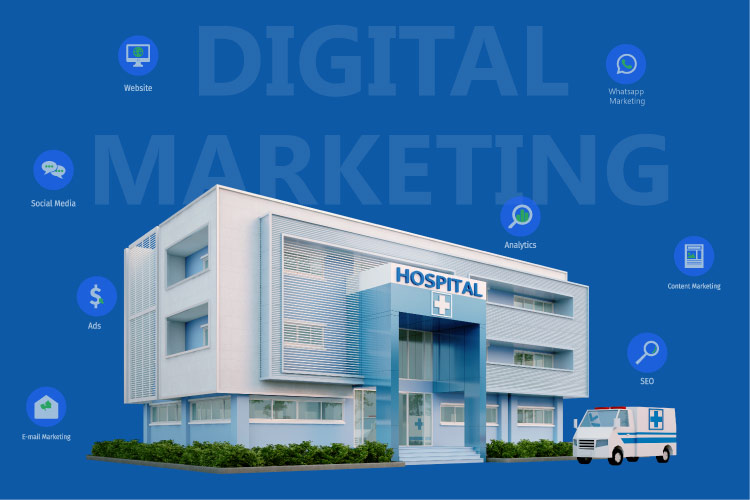
Digital Marketing for Hospitals: Strategies That Drive Results and Revenue
February 4, 2025Book A Free Demo
Latest Marketing Articles
Book A Free Demo
In today’s interconnected world, online reputation management has become a cornerstone of effective healthcare marketing and patient engagement. Healthcare reputation management involves strategically curating and maintaining a positive online image for medical practices and doctors. It encompasses proactive measures aimed at influencing patient and community perceptions in the digital realm. From monitoring patient feedback to actively engaging with online platforms, reputation management efforts seek to foster transparency, trust, and credibility. Through meticulous attention to online presence and patient interactions, healthcare professionals aim to cultivate reputations that resonate with current and prospective patients, ultimately driving practice growth and enhancing patient satisfaction.
In an era where patients increasingly turn to the internet to research healthcare providers and make informed decisions, online reputation serves as a critical determinant of patient choice and satisfaction. A strong online reputation not only attracts new patients but also fosters loyalty among existing ones. Conversely, negative online feedback or a lack of online presence can undermine trust and hinder practice growth. Cultivating and preserving a positive online reputation is thus paramount for medical professionals seeking to thrive in today’s competitive healthcare landscape.
Managing online reputation in healthcare offers many advantages for doctors and medical practices:
Building Trust: Positive online impressions build patient confidence, fostering strong doctor-patient relationships.
Attracting Patients: Favorable reviews and ratings attract new patients to the practice.
Patient Engagement: Active online engagement shows care for patients, strengthening relationships.
Reliability: A good online reputation signals reliability and trustworthiness to patients.
Handling Negative Feedback: Promptly addressing negative feedback demonstrates commitment to patient satisfaction and trust-building.
Attracting Top Talent: A good reputation attracts skilled professionals to the practice, strengthening the team.
Overall, managing online reputation helps practices grow, ensures patient satisfaction, and enhances doctor-patient relationships.
Improving online presence doesn’t have to be complex. Implementing simple strategies can effectively manage online reputation:
Provide excellent patient care: Nothing builds a positive reputation like providing exceptional care and service to your patients. Prioritize patient satisfaction and strive to exceed their expectations.
Analyze and audit your existing reputation: Take the time to assess your current online reputation by reading patient reviews, checking ratings, and evaluating feedback on various platforms.
Claim and manage your Google My Business (GMB) listing: Ensure your practice’s GMB listing is accurate and up-to-date. Respond promptly to patient reviews and questions to demonstrate your commitment to patient satisfaction.
Build a website for yourself and/or your practice: Establishing a professional website is essential for showcasing your expertise, services, and patient testimonials. Make sure your website is user-friendly and optimized for search engines.
Create educational content — Start Doctor Blogging: Share your knowledge and expertise by creating informative blog posts, articles, or videos on healthcare topics relevant to your patients. This not only establishes you as a thought leader but also improves your online visibility.
Monitor your reviews proactively: Regularly monitor reviews and feedback across various platforms, including social media, review sites, and healthcare directories. Address any negative feedback promptly and professionally.
Respond to all reviews: Respond to patient reviews, both positive and negative, in a timely and courteous manner. Thank patients for their feedback and address any concerns or criticisms constructively.
Use social media for practice growth: Utilize social media platforms to engage with patients, share valuable content, and promote your practice. Maintain an active presence and interact with your audience to foster meaningful connections.
Get listed on doctor review sites: Ensure your practice is listed on reputable doctor review sites. Monitor your profiles and encourage satisfied patients to leave positive reviews.
Create medical profiles on relevant directories: Register your practice on relevant online directories and healthcare platforms. This increases your practice’s visibility and makes it easier for patients to find you.
Focus more on patient retention: Prioritize patient retention by providing personalized care, fostering strong doctor-patient relationships, and offering convenient appointment scheduling and follow-up services.
Use YouTube to post promotional content, highlight testimonials, and improve search rankings: Leverage the power of video content by creating promotional videos, sharing patient testimonials, and optimizing your YouTube channel.
Implementing these strategies effectively manages online reputation, attracts patients, and establishes trust within the community.
In conclusion, reputation management plays a pivotal role in the success of medical practices and doctors in today’s digital landscape. By actively cultivating a positive online reputation, addressing feedback, and delivering high-quality care, practices can build trust, attract patients, and maintain a competitive edge in the healthcare industry. Prioritizing reputation management is not just a marketing strategy but a fundamental aspect of providing exceptional patient care and fostering long-term success.


